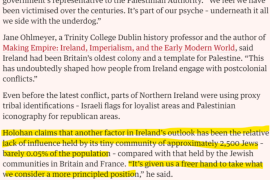The Guardian’s Chris McGreal blamed “far-right American Jews” for “enabling Netanyahu’s court take-over” in a March 24th article focusing on the alleged influence of the Kohelet Policy Forum on efforts to overhaul the country’s judiciary.

The article’s thesis is based on comments by Israeli MK Gilad Kariv, who told McGreal that “Jewish donors” to Kohelet were driving and financing the judicial overhaul.
However, later in the article, McGreal, in his own words, expands upon – as he so often does – the ‘circle of Jewish influence’:
The moves to weaken the Israeli supreme court are also influenced by another US organisation, the Tikvah Fund led by Elliott Abrams, a neoconservative former senior official under several Republican presidents who played an important role in the US’s bloody involvement in Central America in the 1980s and one of the intellectual architects of the invasion of Iraq 20 years ago.
First, regarding McGreal’s claims that the Tikvah Fund is influencing efforts at overhauling the judiciary, we were unable to find any evidence of their involvement in judicial reform, so we reached out to Amiad Cohen, CEO of the Israeli-based Tikvah Fund, who flatly denied the claim. He told CAMERA UK in a phone call earlier that the Israeli and US wings of the organisation “are not involved in any way, politically or financially, with the legislation to reform Israel’s judiciary”. (We’ve complained to Guardian editors asking for a correction.)
However, in addition to getting his facts about the Tikvah Fund and judcial reform wrong, McGreal’s characterisation of Elliott Abrams as “one of the intellectual architects of the invasion of Iraq” is inaccurate.
It also evokes antisemitic tropes poular at the time of the US-led 2003 invasion which blamed the Israel lobby and/or Jews within the US government for the war, despite the fact that all the major players in the administration of George W. Bush were non-Jews. This includes Bush himself, Vice President Dick Cheney, Secretary of State Colin Powell, Secretary of Defense Donald Rumsfeld and National Security Advisor Condoleezza Rice.
Abrams, who is Jewish, was not – unlike Bush, Cheney, Powell, Rumsfeld and Rice – one of the principle decision makers in the White House in 2003, working as Special Assistant to the President and Senior Director of the National Security Council for Near East and North African affairs at the time. Though Abrams strongly supported the war, McGreal’s characterisation of him as the war’s “intellectual architect” erroneously suggests a level of influence similar, for instance, to George F. Kennan’s role in formulating the Cold War policy known as “containment” which was adopted by President Harry Truman.
Abrams’ influence, by contrast, within Bush’s administration in the decision to launch the Iraq war was, by nearly all accounts, close to non-existent.
The Guardian, as our readers of course know, has a history of depicting Jews has having ‘too much’ power, including the power to control, or apply outsized influence on, non-Jewish political leaders – getting them to make putatively destructive decisisons they wouldn’t normally have made. McGreal’s farcical depiction of Abrams as the brains behind the most contentious US military adventure since Vietnam is another example of the outlet’s embrace of this toxic narrative.




